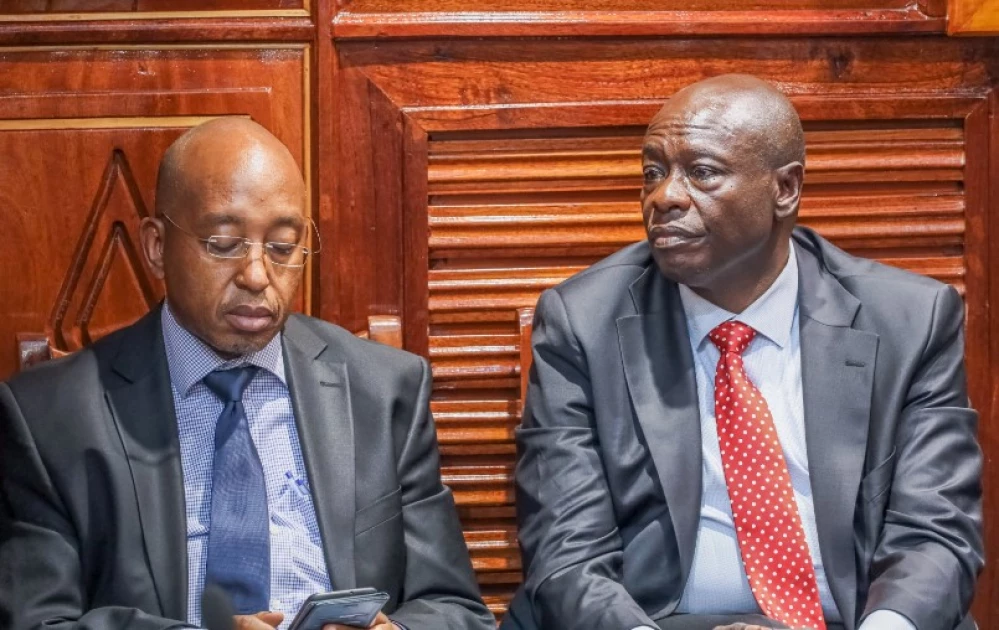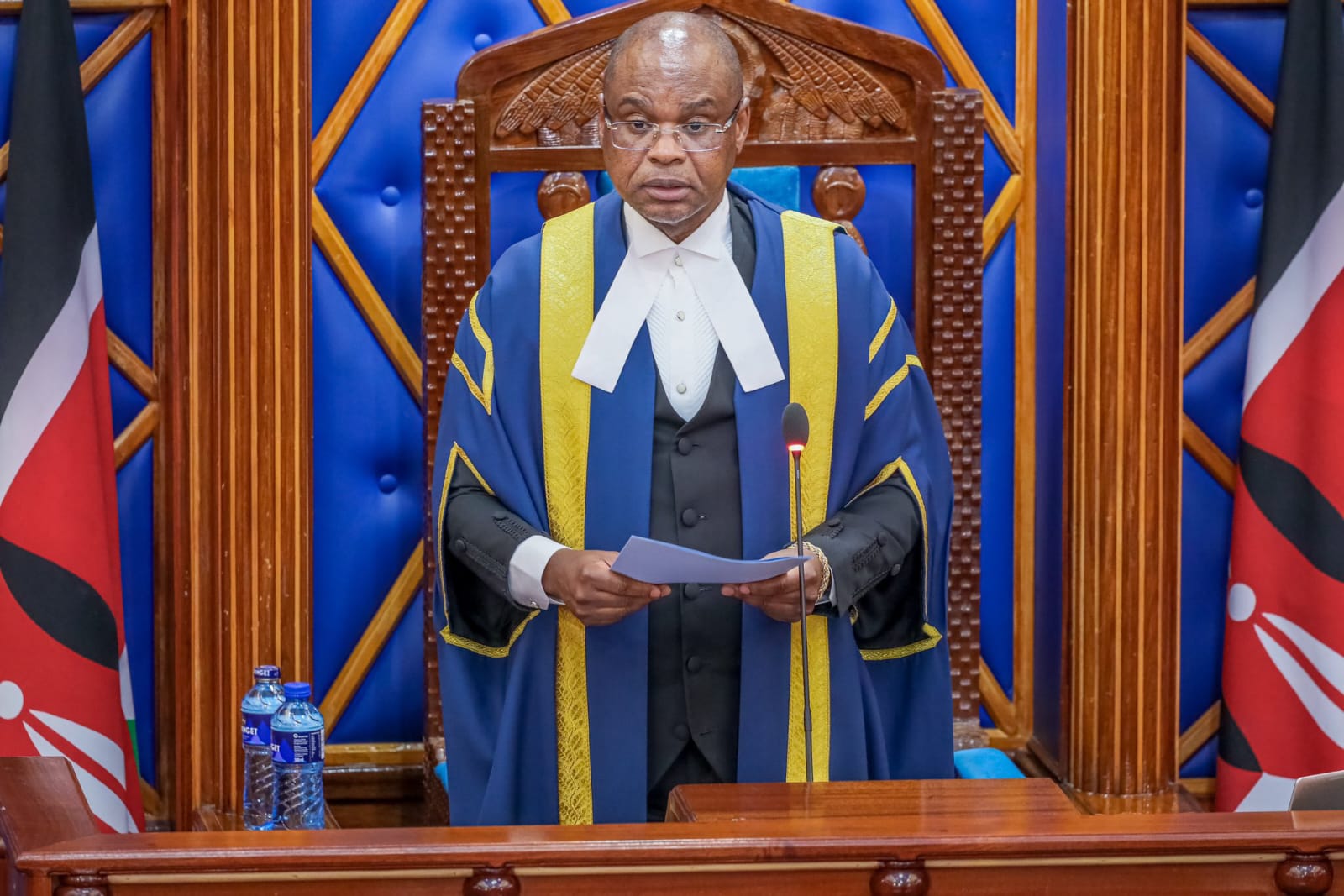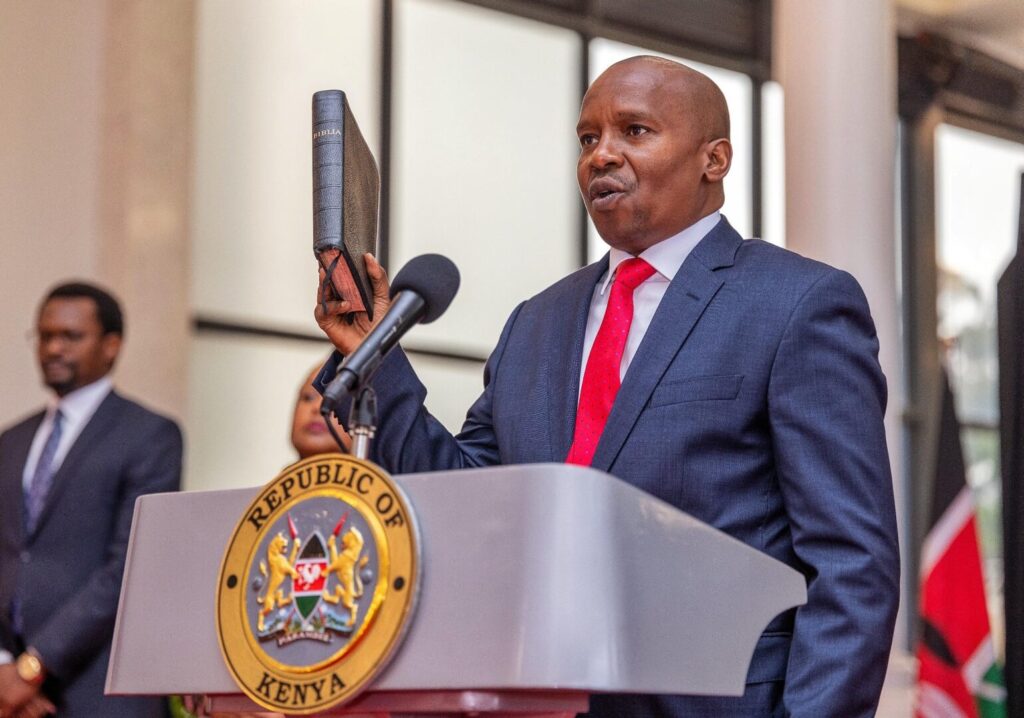Contents
- 1 Who is Rigathi Gachagua? A Closer Look at the Self-proclaimed ‘Truthful Man’
- 2 The Unfolding Court Case: What Led to Gachagua’s Impeachment?
- 3 Understanding the Context of Gachagua’s Impeachment: Gachagua Impeached while Hospitalized
- 4 Prof. Kithure Kindiki: Ruto’s Deputy President Nominee Hurriedly Nominated and Approved by Parliament
- 5 Who is Kithure Kindiki, Incumbent Kenyan Vice President?
- 6 Ruto’s Response (or Lack Thereof): The Political Ramifications of Gachagua’s Impeachment
- 7 The Aftermath of Gachagua’s Impeachment: Courts Rule to Halt Kindiki’s Swearing-In
- 8 Gachagua Impeachment by the Senate a New Low for Kenyan Politics
Kenya’s political landscape has been shaken by the recent impeachment of Deputy President Rigathi Gachagua by the Senate. This unprecedented move has left many questioning the future of the country’s leadership, especially with the swift nomination and parliamentary approval of Prof. Kithure Kindiki as Gachagua’s replacement. In this article, we delve into the details of the historic impeachment, look at the inconsistencies therein, and investigate the motivations behind the rushed appointment and approval of Kithure Kindiki as Kenya’s deputy president-elect.
Who is Rigathi Gachagua? A Closer Look at the Self-proclaimed ‘Truthful Man’
To fully grasp the implications of this impeachment, it’s essential to understand who Rigathi Gachagua is. Born in 1965, Gachagua has made significant strides in Kenyan politics, initially serving as a one-term member of parliament for Mathira Constituency in Nyeri, before ascending to Deputy President following his selection as William Ruto’s running mate in the 2022 general elections. His age, approximately 59 years, positions him among the seasoned leaders in the political arena.

Gachagua’s rise to power has been marked by both achievements and controversies. As Deputy President, he was responsible for various initiatives and roles, as assigned by the president, but faced increasing scrutiny over his governance style and decision-making processes. Gachagua’s zeal and outspoken nature, for one, could have ultimately been the reason why he was impeached, particularly after making remarks likening the country to a company with “shareholders”.
Even so, pundits stipulate that Gachagua’s woes stem from his fallout with the president, particularly due to his refusal to support various Ruto-led initiatives, and his objections to various government positions. The self-proclaimed “truthful man” and his refusal to support government policies that were against the interests of ordinary Kenyans, I argued, was one of the 6 reasons why Gachagua was impeached.
The Unfolding Court Case: What Led to Gachagua’s Impeachment?
Rigathi Gachagua’s impeachment stemmed from a series of largely cooked-up allegations against him; ranging from corruption and insubordination of the president, to gross misconduct while in office.
A significant portion of the evidence presented by the mover of the motion to impeach Gachagua, Kibwezi MP Mwengi Mutuse, revolved around claims that Gachagua had engaged in corrupt practices that undermined public trust in the government.
Mutuse, who underwent a fiery cross-examination by the DP’s counsel, Elisha Ongoya was at pains to provide any substantial and actionable evidence against Gachagua.
Instead, he relied on half-truths which included admissions such as “I imagined”, “I thought”, and “I expect”, largely failing to bring forth any real evidence. He even admitted that all he had to do was create a “prima facie” case, which translates to “at first view”.
In a historic vote, key senators, including prominent opposition figures, rallied together to remove Gachagua from office. Their decision, seemingly one that reflects a growing dissatisfaction with the current administration and highlights the role of accountability in Kenya’s political discourse, may have more to it that meets the eye.
What is even more shocking, is the speed at which the whole process has been done. Kenyan members of parliament are, perhaps, the most inefficient in the world but this time, perceivably under instructions and coercion from the executive, executed Gachagua’s impeachment with “military-like” precision, as Senate Speaker Amason Kingi put it.
Understanding the Context of Gachagua’s Impeachment: Gachagua Impeached while Hospitalized
Rigathi Gachagua, who had been adamant he would not be intimidated or cowed into resignation, had been a faithful attendee of his own impeachment trial at the Senate; for the two days it was happening, starting Wednesday, October 16th. Shockingly, however, on the last day after the lunch break, when he was set to defend his case via a statement and cross-examination, the DP was a no show.
It was moments later that his lead counsel, Senior Counsel Paul Muite notified the Senate that the deputy president had been “taken sick”. The senior counsel initially asked to be allowed a few hours to go get a clear picture of Gachagua’s well-being, and on coming back at 5PM later that afternoon, revealed that the DP had suffered “chest pains” and was hospitalized.
Muite asked the speaker of the house to adjourn the hearing, which was a quasi-judicial one with the entire senate sitting as jury, until Tuesday to allow Gachagua some time to recover, and then come and defend himself as he had intended. Gachagua was hospitalized at the Karen Hospital.
The Hidden Hand of the Puppeteer
Perhaps what no one had anticipated, interestingly, was the “hidden hand of the puppeteer” in this entire Gachagua impeachment drama. When the DP’s lead counsel asked for adjournment of the proceedings until Tuesday, Speaker Kingi asked for “five minutes” to deliberate, only to come back after nearly half an hour, and put the decision (on whether to adjourn) to the senators themselves.

Now, a thing that has bothered me since then is.. why ask for only five minutes to think of something so crucial. As the speaker — and in a way playing the role of a judge in a motion to impeach the deputy PRESIDENT of a sovereign nation — why ask for only a five minute break to deliberate and think of whether to adjourn when it has emerged that he is in HOSPITAL, unwell, and unable to appear.
Isn’t five minutes around the time it takes to make a phone call? I couldn’t shake the feeling that, definitely, the break was taken so that a call could be made. To whom? I guess we’ll never know.
A Denial of Natural Justice
The principle of ‘natural justice’, a recognized tenet of the law, indicates that instances of ‘force majeure’ or ‘Acts of God’ are recognized and facilitated for in legal proceedings. As such, it was incumbent on the speaker of the Senate — and the entire house — to understand that DP Rigathi Gachagua had been incapacitated by sickness — a case of force majeure and out of his control — warranting an adjournment.
The speaker’s refusal to grant it, and his ‘washing of the hands’ as Pontius Pilate did, speaks volumes on how independent the entire process of impeaching Rigathi Gachagua really was. Now, when he did pass it over to the senators, he wasn’t even courteous enough to make it a tallied vote but instead went the acclamation (voice vote) way — in a seeming plan to just get the ball rolling as fast as possible. And roll it did.
Kenyan Senate Impeaches Deputy President Rigathi Gachagua Unheard in a Historic, if Not Shambolic Vote
The Kenyan Senate then went on to impeach the deputy president unheard, in a historic yet shambolic vote. In yet another breach of the recognized tenet of the law, ‘natural justice’, Deputy President Rigathi Gachagua was impeached unheard, i.e., without being given the opportunity and chance to defend himself before the Senate. Had he “chosen” not to appear, as the constitution of Kenya stipulates, then that would be okay.
But Gachagua not appearing — when he wants to — due to falling sick and ending up in hospital — a clear case of force majeure — and being denied a chance of an adjournment of the proceedings to a further date, then that is a clear breach of his rights. It is also a show of a lack of humanity on the Senate’s part — and by “the puppeteer” himself.
The fact that Senate is also majorly constituted of President Ruto’s UDA party, the clear majority — and the speaker opting to throw them the decision on whether to adjourn cognizant of this fact — is a clear indication of what really was the objective: kick Gachagua out of office as soon as possible; in preparation for his replacement, one Professor Abraham Kithure Kindiki.
Prof. Kithure Kindiki: Ruto’s Deputy President Nominee Hurriedly Nominated and Approved by Parliament
With Gachagua’s impeachment finalized, President Ruto hastily nominated Prof. Kithure Kindiki to fill the vacant Deputy President position. What’s surprising, is immediately after Rigathi Gachagua was impeached (on Wednesday night), President Ruto went on to — overnight — seek approval for his new nominee, professor Kithure Kindiki from agencies such as the IEBC, EACC, and others, allowing him to send Kindiki’s name as his nominee to parliament yesterday morning.
Even more, Parliament did not waste any time (perhaps due to instructions from the puppeteer) and went on to unanimously approve Kithure Kindiki’s name as the new Deputy President of the Republic of Kenya.
It is maddening how fast Kindiki’s nomination was pulled off and shocking that despite impeaching Rigathi Gachagua — while bedridden and in hospital — his former boss, Ruto, could gleefully and rapidly push through his replacement for nomination — as if to catch a deadline.
The Mashujaa Day Question
There has been talk that the plan was to impeach Gachagua before ‘Mashujaa Day’, a 20th of October holiday in Kenya which can be likened to ‘Heroes Day’. The holiday celebrates the country’s fallen heroes, especially the Mau Mau Fighters, who were at the forefront of liberating Kenya from British Colonial rule; and ironically, some of whom Rigathi Gachagua is a descendant of.
According to Eugene Wamalwa, DAP-K party leader and Azimio opposition figure, the puppeteer had given clear instructions that he “does not want to sit next to Gachagua” on that day, and that Gachagua should be impeached by then.
Who is Kithure Kindiki, Incumbent Kenyan Vice President?
So, who is Kithure Kindiki? A politician and lawyer, Kindiki is known for his extensive education and experience in law and politics. Born in 1972, his age — at 52 years — reflects a seasoned yet (what Ruto hopes) fresh perspective on governance.
Kindiki hails from the Meru tribe of Kenya, adding another layer to the ongoing discussion about ethnic representation. The current administration has come under criticism — riddled with allegations of nepotism — for the apparent ‘politicial-tribalism’ in nominations within the government.

Kithure Kindiki’s political journey has been marked by significant roles in both the Senate and within cabinet, as he is currently the Cabinet Secretary, CS for the Ministry of Interior Security in Kenya. As things stand, it is yet to be seen whether his experience will play a role in positioning him as a more-effective office-holder in the high-stakes role of Deputy President.
Kindiki has also been a long-time friend and ally to William Ruto and has been his lawyer since over a decade ago; when Ruto was facing charges of crimes against humanity in the ICC. Kindiki was also Ruto’s first choice for running mate during the 2022 polls but the technicalities at the time — including the huge population of Gachagua’s political background and ethnic community — meant that Kindiki came second to Gachagua.
Even more, despite what many people may call a good record, Kindiki, as the current minister of internal security has increasingly come under fire for his handling on the recent Gen Z protests in the country. Many, especially the Gen Zs, accuse him of overseeing the extra-judicial killings of 61 protestors, and the abductions and disappearances of dozens more.
Ruto’s Response (or Lack Thereof): The Political Ramifications of Gachagua’s Impeachment
President William Ruto’s lack of reaction to Gachagua’s impeachment has been closely watched. Ruto has expressed nothing about Gachagua’s impeachment since its onset, and has stayed mum on the issue. He hasn’t even come out to emphasize the need for unity and stability in government.
The impeachment poses potential challenges for Ruto’s administration, raising questions about how he rewards trust and loyalty within his inner circle. It is quite unfortunate, I would say, that Francis Imbuga’s wonderful play “Betrayal in the City” could play out so starkly in its home capital city, Nairobi, Kenya.

This political upheaval could also impact Ruto’s future decisions and strategies, as he navigates the complex dynamics of his government and the expectations of the Kenyan public. As a president who, a few months ago, was brought to his knees by the Gen Z insurrection, he will need more allies than foes. Even so, if what has happened to Rigathi Gachagua is anything to go by, he could be making more of the latter.
And you can take my word for it.. Ruto’s play against Gachagua has not only shown him as a political operator who is uncanny, heartless, and disloyal but also as a leader who will put his own personal interest beyond that of his disciples. An ‘Iscariot of Judecean nature’, if you will, who will ram down anything and anyone on his path, including those very loyal to him.
Why would anyone reward political dedication with a contempt so deep that a man who was previously imprisoned while fighting for him, is now laying in a hospital bed, perhaps suffering ‘heartbroken syndrome’? Why on earth would such a leader dream of a political future?
The Aftermath of Gachagua’s Impeachment: Courts Rule to Halt Kindiki’s Swearing-In
As Rigathi Gachagua faces the fallout from his impeachment, his legal options remain a topic of discussion. Gachagua, through his legal team, yesterday challenged the Senate’s decision in court, seeking to overturn the impeachment and restore his position.
He was successful, relievingly, and several courts stayed Kindiki’s nomination as his replacement and halted his swearing-in and occupation of the DP’s office.
Regardless, the road ahead will undoubtedly be complicated — not least by the political heat in the country at the moment — but also by the perceivably slow nature of justice in the country — often delayed by lengthy court processes.
On the other hand, Prof. Kithure Kindiki’s appointment, for some, brings hope for a new direction in leadership. As the security minister prepares to assume the role of Deputy President — if the courts allow it — many are eager to see how his policies and vision will shape the future of Kenya. The transition marks a critical moment in the nation’s history, one that will set the tone for governance in the years to come.
Videos Courtesy of Citizen TV Kenya.
Gachagua Impeachment by the Senate a New Low for Kenyan Politics
Summing up, the impeachment of Rigathi Gachagua by the senate — and the callous manner by which it was undertaken — signals a new low in Kenyan politics, characterized by politically-motivated (yet hypocritical) calls of accountability and the quest for total ‘state-capture’ of the two houses of parliament by the executive.
As the country watches closely, the actions of both Gachagua and Kindiki will be pivotal in determining the future trajectory of Kenya’s political landscape.
Even more, President Ruto’s political manoeuvres, especially his contemptuous campaign against his deputy president and running mate, Rigathi Gachagua will remain a stark warning for his political allies and a historic case of “friend becomes foe”.
Kenyan politicians, for one, will remember not to ever be “too trusting“, as Gachagua had put it, in their political alliances. It may be ‘Riggy G’ who’s thrown to the curb today, and Kindiki tomorrow. Read more opinion articles.
This article was written with the help of A.I for topic research and formulation.







